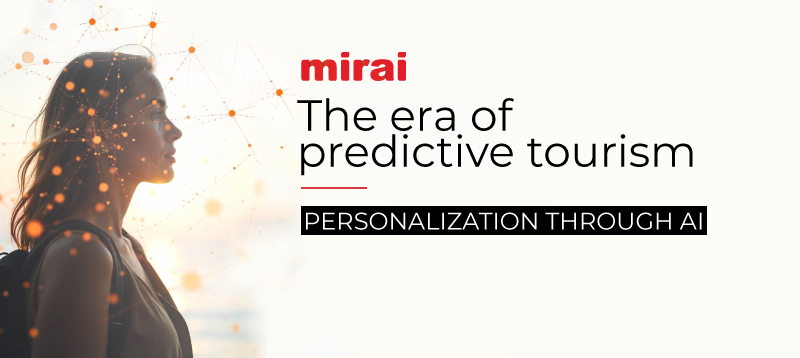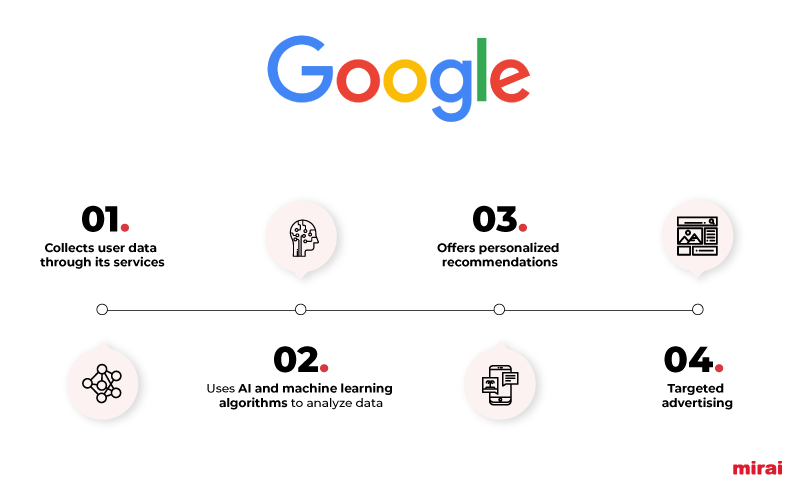En español, en français, em português.
As a hotelier, but also as a traveler: forget the days of generic recommendations. AI is the Travel industry’s crystal ball, predicting what you desire with astonishing accuracy. This isn’t your grandpa’s travel agent; AI knows you better than you know yourself, crafting bespoke travel experiences you never knew you needed.
Say goodbye to endless scrolling and hello to your AI travel companion. It’s like having a personal assistant who anticipates your every whim, curating dream vacations that perfectly match your unique tastes. What once seemed like futuristic fantasy is now your reality!

As a company in the travel sector: AI revolution isn’t just about offering personalized travel experiences. With AI, digital marketing is about to level up and completely transform the game.
What is predictive tourism?
Predictive tourism is the art and science of using AI combined with in-depth data analysis to foresee the needs of travelers and deliver highly personalized experiences. During the planning and booking stages, AI is hard at work, learning about your tastes and preferences, predicting what you’ll need, offering tailored recommendations and personalizing your journey in real-time.
But the magic doesn’t stop there. During the stay, AI continues to enhance your experience:
- Smart Hotels, with rooms that already auto adjust temperature & lighting, have virtual concierges…
- Smart Destinations, with optimized routes & activities based on your real-time location and interests.
- Personalized Experiences: envision tailored guided tours, activities adapted to your fitness level and recommendations for cultural events that you will absolutely love.
Ultimately, predictive tourism aims to make travel more satisfying, efficient and memorable for both travelers and the businesses that serve them.
Key technologies powering predictive tourism
Three technologies are at the forefront of this transformation:
- Machine Learning (ML): this allows machines to learn from massive datasets including travel history, searches and reviews. By identifying patterns within this data, ML algorithms can then predict preferences and provide personalized recommendations.
- Deep Learning (DL): this advanced form of ML uses neural networks to analyze unstructured data such as images, text and voice much like the human brain does. DL can be used, for example, to identify tourist spots in photos.
- Natural Language Processing (NLP): this enables machines to understand, interpret and generate human language in any language. In tourism, NLP powers chatbots, analyzes customer reviews and can translate languages.
Benefits for Travelers and Businesses
The benefits of predictive tourism are significant:
For Travelers
- Personalized experiences with tailored recommendations that match individual tastes and budgets.
- Time and effort savings as AI handles the often-tedious aspects of planning.
- Discovery of new options that push travelers outside of their usual comfort zones.
For Tourism Businesses
- Increased customer satisfaction and loyalty by providing memorable, personalized experiences.
- Resource optimization and operational efficiencies
- Increased profitability by matching the right products with the right customers at the right time (such as the sales of extras).
- Better informed decision-making based on data-driven insights into traveler behavior.
Social Media and Google: Key Players
Social media is a goldmine of inspiration and decision-making for travelers. These platforms play a crucial role in predictive tourism, serving both as a key source of data and as a playground for AI. It functions as a rich source of user-generated data, offering insights into traveler preferences, behaviors and sentiments. And, at the same time, it serves as a platform where AI algorithms can analyze this data to identify trends, predict future travel patterns and personalize recommendations for individual users. This personalization extends to targeted advertising, ensuring that users are exposed to promotions that align with their interests and travel aspirations.
The Google ecosystem is a powerful force in predictive tourism, acting as a significant data collector, a platform for AI analysis and a playground for targeted recommendations and advertising. Google’s extensive reach and diverse services provide a wealth of information that AI uses to personalize travel experiences. Here’s how:

- Google collects massive amounts of user data through its various services, including:
– Android: user behavior, location and app usage data from Android devices.
– Maps: user locations, travel patterns and points of interest.
– Search: user interests, travel intentions and needs from search queries.
– Gmail: user communications, bookings and personal preferences from email data.
-YouTube: user interests and preferences from video viewing habits.
-Google Analytics: user behavior and interests from website data.
– Google Display Network: data collected across the web on sites that use Google’s network.
- AI and Machine Learning analysis: Google utilizes sophisticated AI and machine learning algorithms to analyze the vast amounts of data it collects. This analysis helps to:
– Understand user behavior: Google’s AI can identify patterns in user searches, navigation history, and app usage to understand travel preferences and needs.
– Predict traveler needs: By analyzing the data, Google can predict what travelers are likely to want or need in the future, enabling personalized recommendations.
- Personalized recommendations: Based on its analysis, Google provides recommendations for:
– Destinations: suggesting locations that match user interests and preferences.
– Flights and Accommodations: offering options that align with a user’s travel patterns and budget.
– Activities: recommending things to do based on location and user interests.
- Advertising: Google uses its data to deliver targeted ads based on user’s interests and other relevant data.
AI for travel in action: other examples
Several initiatives and platforms are already harnessing the power of predictive tourism:
- Lumo: this platform uses AI to predict flight delays by analyzing historical data, weather and air traffic information, empowering airlines and airports to better inform passengers.
- Chatbots: these provide 24/7 customer support, multilingual capabilities, efficiency, personalization and scalability.
- Amadeus’ Triportation: this platform uses virtual reality, digital twins, AI avatars and voice interfaces to create more immersive booking experiences.
- RoomPriceGenie: this tool uses AI to automate pricing and maximize revenue in real-time by adapting to market conditions.
- Layla: an AI-native travel agent which provides personalized recommendations and builds itineraries for travelers.
- Booking.com’s AI Trip Planner vs. Expedia’s Romie: both platforms are using AI to personalize the user experience, with Booking.com focused on planning and Expedia more on assistance.
- TripAdvisor + Perplexity: the integration of TripAdvisor reviews and Viator experiences with Perplexity’s search capabilities aims to offer personalized recommendations.
AI and the Hotel Industry: A new Era of Guest Experiences
Hotels stand to gain immensely from the AI revolution. By leveraging predictive analytics and personalization, they can elevate guest experiences, streamline operations and foster loyalty:
- Personalized stays: AI can analyze guest data to curate bespoke experiences, from tailored room preferences to personalized activity recommendations.
- Smart rooms and services: imagine rooms that intuitively adjust to guest preferences and AI concierges that offer 24/7 assistance in multiple languages.
- Proactive service: AI can predict guest needs before they arise, ensuring a seamless and delightful stay.
- Operational efficiency: optimize staffing, energy use & resource allocation, leading to cost savings
- Revenue Management: AI-powered dynamic pricing and revenue management tools can maximize profitability.
- Enhanced marketing and loyalty: personalize marketing campaigns and loyalty programs, driving more engagement
The possibilities are endless, and the hotels that embrace AI will undoubtedly lead the pack in delivering exceptional guest experiences and achieving sustainable business success.
Challenges and Barriers
As promising as predictive tourism is, there are challenges to address:
- Data privacy: the ethical and secure handling of personal information is paramount.
- Compliance: adhering to regulations like the GDPR in Europe can also be a challenge.
- Bias: AI systems can introduce bias that may discriminate against certain customers.
- “Hallucinations”: undermines reliability and trustworthiness of AI, hindering their progress and adoption.
- Over-reliance: there is a risk of becoming too dependent on a few tech companies.
The future of AI in tourism
AI is fundamentally changing tourism through personalization and predictive analysis. The use of data analysis enables businesses to anticipate traveler needs and preferences, improve their experiences and increase their revenues. While some challenges remain, the progress and speed of adoption is dazzling, with plenty of use cases, start ups and success stories every week. As I write this post, Chinese new player, Deepseek, announces a new model (R1) shocking the AI industry for its efficiency and great performance, with just a fraction of the training investment and hardware requirements, which will accelerate the adoption of this game-changing technology.
AI-driven personalization in tourism is no longer optional, it’s becoming the baseline, enhancing efficiency and customer satisfaction. Businesses that fail to leverage predictive analysis to anticipate and meet traveler needs, will become obsolete. The future of tourism demands AI integration. Adapt or perish.
It’s time to reflect on how these AI-powered tools can be integrated into your projects. Tourism is evolving rapidly. Get out of your comfort zone and get ready for change!



